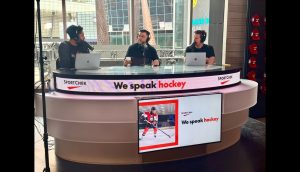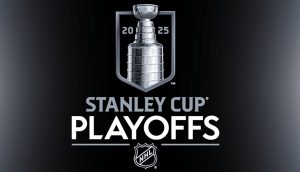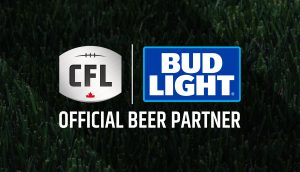Update: Rogers announced its broadcast schedule for the NHL season shortly after this piece was published. Sections below have been updated to reflect that announcement.
This year’s NHL season won’t look anything like fans have seen before – including when it comes to the ads and sponsors on and around the ice.
The regular season NHL schedule, slated to begin on Jan. 13, will see each team play 56 games, down from the usual 82, and conclude on May 8. The top team in each of the four divisions will qualify for the Stanley Cup Playoffs, expected to conclude in mid-July. So far, all Canadian teams have been given the green light to host home games except for the Winnipeg Jets, which hasn’t as yet received approval from the Manitoba government.
With Canadian teams not being able to cross the border, the league’s divisions have been realigned – and, for the first time, carry the names of sponsors.
The Scotia NHL North Division – containing the league’s seven Canadian teams – joins the Honda NHL West Division, Discover NHL Central Division and Mass Mutual NHL Division. Each team has also been given the ability to make new kinds of sponsor deals, most notably helmet advertising for home and away games, as well as on practice helmets, something TSN reported is being forecast to bring in up to $15 million in revenue.
Mike Lang of sponsorship agency Lang Partnerships Network believes the competition and rivalries that will come from Canadian-only division is the best thing that could happen for broadcast ratings, but feels like helmet advertising “does nothing for established brands like Scotiabank.”
“I suspect it’s a make-good of sorts [because of the 2020 season],” Lang says, something backed up by the fact that many of the helmet ads spotted from Canadian teams so far are coming from brands that have naming rights to their respective arenas, where in-stadium ads have lost much of their impact. “But I wouldn’t do it. It’s overkill and does not help sell product.” When it comes to sports sponsorship, he says the hierarchy of consumer relevance still stands – I’m loyal to my team, I love a certain player and the league is last in emotional equity.
Other new ad opportunities this season include virtual on-ice advertising placed in the area around the blue line digitally, although details are still being worked on that with broadcast partners. Other virtual advertising includes expanded bench signage on the boards behind the coaches, and edge wrap advertising is available just above the boards behind both nets. Tarp seat covers, seen in last summer’s playoffs, are back and available for sponsor logos from teams that wish to offer them.
Kyle McMann, the NHL’s SVP of North American business development and global partnerships, says the ad and sponsor marketplace has been strong and there seems to be lot of interest in live sports. Even though announcements about sponsor and ad deals are coming closer than they typically would to the start of the season, he says several are going to come out shortly.
“I think it’s a testament not only the sponsor marketplace but also the interest in figuring out how to bring brands to life in a new way. There’s a lot the power in live sports programming.”
Nestle Canada is the most recent brand to sign on as an NHL sponsor in Canada. Other Canadian sponsors include Canadian Tire, Danone, Esso, Kellogg’s Frosted Flakes, Kraft-Heinz, Kruger Products, Labatt, Molson Canadian, Nestle Kit Kat, Nutrl Vodka, Pinty’s, Rogers, Scotiabank, Sobeys and Tim Hortons.
The U.S. broadcast schedule was announced on Wednesday, and on Friday, Rogers announced its plans for the Canadian broadcasts, covering 300 matchups on TV and streaming, as well as 140 radio broadcasts. Sportsnet will have 64 games, including all Vancouver Canucks, Calgary Flames and Edmonton Oilers games, as well as 38 Toronto Maple Leafs, 22 Montreal Canadiens, 16 Ottawa Senators and 14 Winnipeg Jets games. The games not on Sportsnet are mostly covered by regional deals with Rogers, Bell’s TSN and Quebecor’s TVA, and CBC will once again be broadcasting the weekly Hockey Night in Canada broadcast, for which Rogers sells the rights to the public broadcaster (Saturday games are also available on Citytv and Omni).
Mike Smith, group head of sponsorship for Diamond Marketing Group, says the league is aggressively looking for new ways to recoup revenues it lost in the heavily disrupted 2020 season, during which franchise values fell by 2% for the first time in two decades. Sponsorship revenue was down significantly – which meant the league needed to make up the value going into this season or have brands pull out.
“There’s been a massive drop in revenue associated to the NHL,” he says, pointing out that the league only grossed $4.4 billion, a drop of 14% and numbers that have not been seen since 2016. “So, you have franchise value going down by 2%, then revenue dropping by 14%. Those are two massive problems.”
























